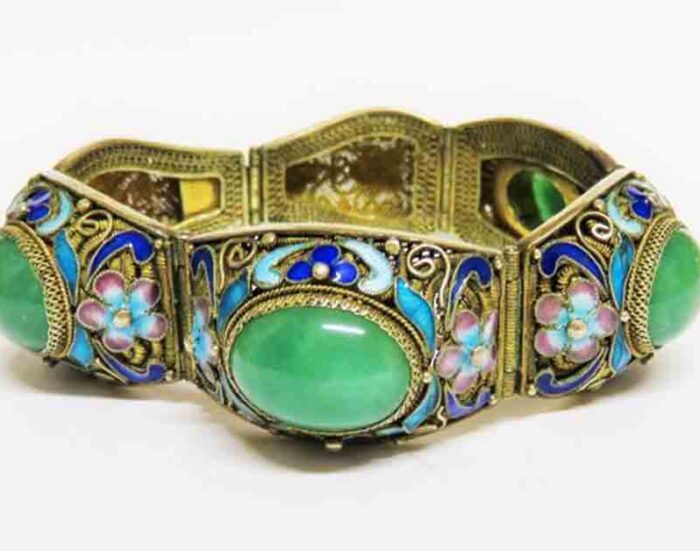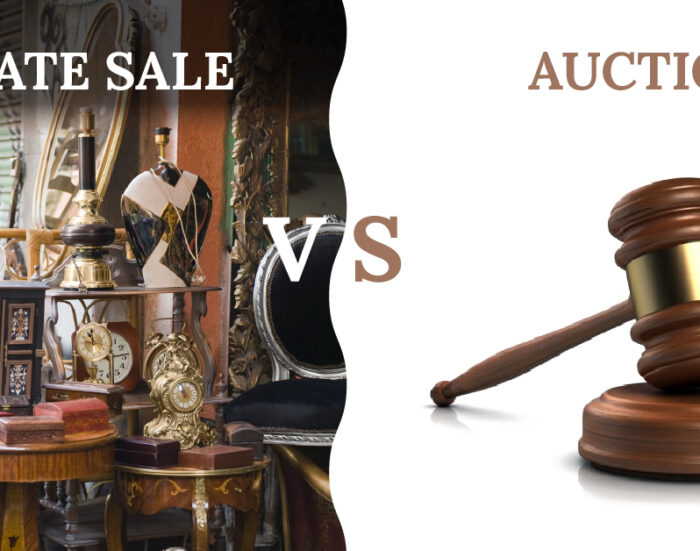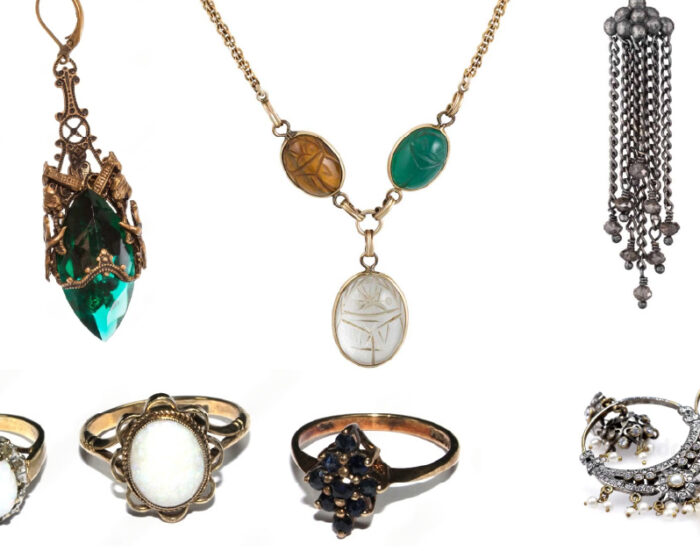Exploring Exquisite Finds: Vintage & Rare Asian Green Jade
When you think of Jade, you likely conjure images of intricately carved oriental sculptures in antique emerald green. In recent years, vintage jade jewelry has become famous for its shiny and smooth bangles, earrings, and necklaces.
Jade is one of the oldest known gemstones and is a testament to nature’s artistry. Its unique qualities, including toughness, strength, and ultimate charm, make it a rare and precious find. For thousands of years, it has been sculpted into everything from vintage jade jewelry to tools, with each piece serving as a testament to its timeless allure.
Are you ready to impress your loved one with a Green Jade Jewelry?
Green Jade Jewelry can make a wonderful gift for your loved one. Jade is a popular gemstone for centuries due to its beauty and durability. It is believed to bring the wearer good luck, prosperity, and happiness. Green Jade, in particular, is associated with serenity, balance, and harmony. It looks stunning in various jewelry pieces, such as necklaces, bracelets, and earrings. Whether you are looking for a birthday present, an anniversary gift, or a token of affection, a piece of green jade jewelry can be a thoughtful and meaningful choice. For those who possess vintage pieces, an antique jade jewelry appraisal can provide insight into the item’s value and history, ensuring that it is cherished for its full worth.
Timeless Asian Jewelry- Jade Goes Beyond the Color of Green
In the early ages, Jade was considered a supreme material for tools and weapons production. As Jade has spectacular qualities of yielding different colors and could be effortlessly polished to bring out a brilliant glow, people began to carve Jade into ornamental objects & antique jade jewelry. This jewelry, often imbued with cultural significance, became treasured heirlooms. Jade is deeply integrated into several cultures, including the Asian culture; Asians believe that green Jade is an offering worthy of ancestors and Gods due to its medicinal properties. Jade was considered to possess five distinct virtues:
- Benevolence
- Bravery
- Clean and honest
- Righteousness
- Wisdom
In the early 3000 B.C., Jade was revered as a “Royal gem” in China—much like diamonds and gold, valued in Western countries. According to Chinese feng shui practice, Jade possesses a light, nourishing, and sweet energy with a soothing purity. Jade was worshiped as the most appreciated gemstone used to make good luck charms, attract friends, protect and support loving hearts, or create wealth.
Have you ever wondered what Estate Jewelry really means? What sets it apart and makes it truly antique? Let’s delve into the fascinating world of Estate Jewelry and discover its allure.
When you think about Estate vintage jewelry, it has to be pristine and should be acquired from estates. Estate jewelry may be antique (as old as or over a century old) or vintage (at least two decades old).
Estate antique and vintage jewelry pieces are stunning for day and night events.
Art Deco Era
The geometric, streamlined, stylized, and symmetrical jewelry of the Art Deco Era depicts the modern age and often involves involves diamonds, emeralds, rubies, and sapphires.
Art Nouveau Era
Although short-lived, the Art Nouveau Era left its mark with its curving, dynamic, flowing, and rippling features. Today, they are one of the most sought-after vintage jewelry.
Victorian Era
Renowned for its sense of romance and sentimentality, Victorian-era estate jewelry depicts the life (youth, courtship, and marriage) of Queen Victoria, coupled with natural designs etched in gold. Estate jewelry of this era may include brooches and lockets. While gemstones were readily affordable in this dispensation, diamonds, gold, platinum, and silver became integral parts of the craftsmanship of the Victorian era.
Professional Antique Auctioneer at Antique Appraisers Auctioneers
Antique Auctioneering defines the sale of antique jewelry by skilled professional auctioneers. By taking bids and selling several items in an auction, professional antique auctioneers are equipped to ensure the smooth transfer of antique jewelry to new owners.
Typically, a catalog listing the items for sale is available to all attendees at the auction’s beginning. In addition to becoming a specialist in antique jewelry and a shrewd businessperson, a professional antique auctioneer must be appreciative and knowledgeable about antique jewelry pieces. They must also be ready to examine them to evaluate their age, condition, origin, and quality, confer with experts and historians, assure the authenticity and proof of ownership of each piece, and keep detailed records of all pieces.
Estate Jewelry Buyers in Connecticut, New York
Be it antique or vintage jewelry, for estate jewelry buyers, in addition to the attraction to the history of each piece of jewelry, there is the thrill of sharing its history. Also, possessing estate jewelry is a means of honoring the craftsmanship and talent of that era while being simultaneously transported to that time and place to share in the special moment when that piece of jewelry meant something special to its original owner.
At Antique Appraisers Auctioneers, we pride ourselves on being the oldest antique buyers in New York and Connecticut. Our team of experts is ready to handle your queries online. Simply send us photos with a detailed description, and our experts will provide a free quote, ensuring you have all the information you need to make an informed purchase.
What is the difference between an estate sale and an auction?
Estate sales and auctions are two unique techniques for selling property from the estate of a deceased individual. While both serve the aim of liquidating assets, they differ greatly in the manner in which they are carried out, the amount of control over pricing and length, and the entire experience for both sellers and bidders. We’re going to go through these differences in depth so you can determine which choice is best for you.
1. Pricing Control:
• Estate Sale: An estate sale is typically managed by an estate sale company or professional. In this configuration, the firm is in charge of pricing each item based on their experience and market information. Prices are often determined before the start of the auction in order to maximize the total profit for the estate.
• Auction: In contrast, auctions are conducted by auctioneers or auction companies. Here, prices are not predetermined but instead determined by the competitive bidding process. Bidders compete to offer the highest price they are willing to pay, often leading to dynamic and sometimes unexpected outcomes.
2. Duration:
• Estate Sale: Estate sales are sometimes held over several days, usually over a weekend or more. Items’ prices may be gradually reduced during this time to increase sales. It allows interested purchasers to come to the sale at their discretion.
• Auction: Auctions are relatively short-lived events, usually lasting just a few hours. Bidders gather at a specific time, and the pace can be quite fast. Bids are accepted for a brief period on each item, with the price typically increasing as bidding continues.
3. Buyer Experience:
• Estate Sale: Buyers at estate sales can take their time examining items, asking questions, and making purchase decisions at their own pace. There is often room for negotiation or bargaining with the estate sale company or individual sellers.
• Auction: Auctions are known for their competitive atmosphere. Buyers engage in rapid bidding, often responding to the bids of others. It can be an exhilarating experience for some, but it may not allow for as much leisurely consideration as estate sales.
4. Unsold Items:
• Estate Sale: It is common for some items to remain unsold at the end of an estate sale. The estate owner can decide what to do with the items that don’t sell at the estate sale. They can give them to charity, sell them to another dealer, or get rid of them in some other way.
• Auction: Auctions tend to have a higher likelihood of selling all or most of the items offered. Sellers can make sure they don’t sell their items for too little by setting a reserve price or minimum bid for each item. It means the item won’t sell unless someone bids at least that amount.
5. Fees and Costs:
• Estate Sale: Estate sale companies typically charge a commission based on the total value of the items sold. The commission can vary but is often a percentage of the sales. Sellers may also incur advertising and setup costs.
• Auction: Auctions may charge a buyer’s premium, which is an additional fee added to the winning bid. The fee goes to the auction house. Sellers also have to pay a fee to the auction house, but it’s usually part of the final sale price. The fee depends on how much the item sells for.
In conclusion, both estate sales and auctions have advantages and disadvantages. Estate sales offer more control over pricing, a longer sales period, and a less competitive atmosphere. Auctions are more exciting and competitive than estate sales. You can bid on items and try to outbid others. It can increase the worth of the items, particularly if they are valuable. You should choose the option that works best for you, depending on what you want to sell, how much you want to make, and how you like to sell. At last, it is important to carefully weigh all of these factors and maybe talk to specialists in both fields to identify the best solution for your specific estate liquidation needs.
Best Places to Sell Estate Jewelry: How to Buy Estate Jewelry Locally
Are you in possession of estate jewelry that you want to sell? Confused about where to start? Tired of looking for the “best estate jewelry buyers near me?” If you answer yes to all these questions, then this blog post is designed just for you.
Through this guide, we will help you to know about some of the best places where you can approach converting your precious pieces into cash.
So, let’s get started with our discussion:
What are the Best Options for Selling Estate Jewelry?
- Auction Houses
You can consign your estate jewelry pieces to a trusted auction house specializing in jewelry sales. Reaching out to these places will help you to attain higher sale prices. It’s because auctions can attract serious enthusiasts and collectors.
- Online Estate Jewelry Buyers
You can explore online jewelry buyers who operate globally or nationwide. These websites or platforms are known for offering you much-needed convenience. It’s because you can get access to a large market of potential buyers.
- Local Estate Jewelry Buyers
Another best option behind you is to find top estate jewelry buyers operating in your local area. These buyers tend to have a lot of vintage and antique jewelry knowledge. As a result, it helps you evaluate your pieces’ actual value.
Essential Tips to Follow for Discovering the Best Places for Selling Estate Jewelry
- Do Meticulous Research
When settling on local estate jewelry buyers, you should conduct a comprehensive research. As a part of it, you need to closely examine their testimonials, ratings, and reviews, which they have received from their past sellers. You can check their experience and trustworthiness in handling estate jewelry by ensuring this.
- Check Online Reputation
Before you decide to select online estate jewelry buyers, you should check their online reputation, which is possible through careful research. It will help you to verify their track record and credibility. As a part of it, you can consider checking customer feedback and reviews to get a clear idea about their reliability.
- Compare Commission Rates
Comparing commission rates is essential if you have decided to consign your estate jewelry to an online platform or auction house. It will help you find the most favorable terms for your sale and ultimately boost your profits.
Additional Things to Consider While Selling Antique Estate Jewelry
- Professional Appraisal Services
Opting for professional appraisal services, which qualified jewelry appraisers typically offer, is recommended. Following this step is vital before you sell your estate jewelry. With this aid, you could know the actual worth of your pieces.
- High-Quality Photographs
You should never overlook the importance of high-quality photography to get the best prices. As a part of it, take clear and best-quality photographs of your estate jewelry. It will help you to showcase its beauty and details in the best possible manner. Ultimately, it will attract prospective buyers. It also helps you to stand out in the market.
- Preserve Originality
If your estate jewelry has original documentation, certificates, or packaging, you should keep those intact. These elements will help you receive the best value while selling your pieces.
Final Words
Now, more than half of your job is done. It’s time to connect with the right buyers and find the right platforms for selling your precious asset.
We are sure you have found this discussion to be insightful!



